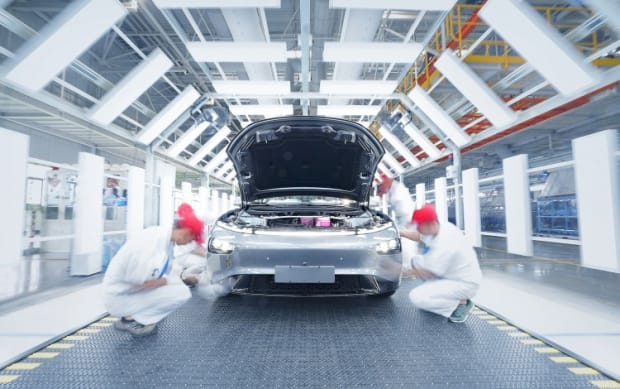Things are going to get interesting in the highly watched and tracked electric vehicle market.
In recent weeks, Tesla's (TSLA) rivals have sharpened their weapons.
They have, like Ford (F) and General Motors (GM), stated their ambitions to produce millions of electric cars from 2025 and 2026. Others, like Rivian (RIVN) and Lucid Group (LCID), are about to start construction of their second factory.
Among foreign car manufacturers, Volkswagen (VLKAF) is preparing to launch Porsche in pursuit of Tesla by giving the vehicle its independence, while Honda (HMC) has joined forces with electronics giant Sony (SNE) to develop electric vehicles with on-board technologies that will make them look like living rooms.
And Tesla in all this?
The company led by Elon Musk seems ready to face all these rivals.
One of its weapons: to significantly increase its production in order to increase its market share in this market that the company currently dominates.
And to do this, Tesla has just launched a recruitment campaign for its Gigafactory in Berlin, just two days after obtaining the permit.

'Giga Berlin Is Allowed to Open'
On its website, the car manufacturer has posted various job advertisements and above all displays a message that could not be clearer: "Giga Berlin is allowed to open," Tesla posted on Twitter in German.
The company added: "Come join the team!"
This frenzy suggests that Tesla will soon start manufacturing the Model Y electric SUV in Germany, aimed primarily at the European market.
On the website, a multitude of jobs have been posted. Some job descriptions are in German, while others are in English. The electric vehicle manufacturer is recruiting for both the car factory and the battery factory. Virtually every department, from supply chain to human resources, has vacancies.
But the bulk of the positions are in the manufacturing, supply chain and Engineering & Information Technology departments.
The automaker, which is facing accusations of racism and discrimination by former black employees in the United States, took care to display in English at the end of each job advertisement its commitment to equality and diversity.
"Tesla is an Equal Opportunity/Affirmative Action employer committed to diversity in the workplace. All qualified applicants will receive consideration for employment without regard to race, color, religion, sex, sexual orientation, age, national origin, disability, protected veteran status, gender identity or any other factor protected by applicable federal, state or local laws," wrote the company.
"Tesla is also committed to working with and providing reasonable accommodations to individuals with disabilities. Please let your recruiter know if you need an accommodation at any point during the interview process."
While Tesla finally got its permit after months of delay, the company still has to meet a few requirements before starting production, according to German authorities.
Start of Production Before The End of March?
Some of the requirements are about the measurement of air quality -- measuring devices must be installed and these must be controlled -- the concept for the prevention of incidents must be submitted for example.
It would take about two weeks for Tesla to meet these requirements, according to German authorities. Based on this assumption, the company could start manufacturing cars in its German Gigafactory around March 20.
Tesla has not yet given any date. Some of the job advertisements indicate that successful candidates should start in May/June, while others simply have no start date.
The Berlin gigafactory is very important for Tesla.
In Germany, Tesla will inaugurate the 4680 cell structural batteries, which will be used in the Model Y SUV made in Europe. These batteries will inaugurate a new platform, basically a new technique.
The new structural batteries will be built in such a way that Model Y seats will be attached directly to them, saving even more parts, space and money.
The two ends of the Model Y will be connected by the battery pack, which will also serve as a connecting element.
This new architecture is inspired by the aviation and aerospace industry, where fuel tanks (found in aircraft wings, for example) often also fulfill a structural function.
Tesla thus hopes with the 4680 cells to revolutionize the battery, the central element of the electric vehicle.
Tesla plans to build the Model Y SUV at the plant. It is aiming to build up to 10,000 vehicles a week.
The company's plan to take a chunk of the European electric vehicle market rests on the shoulders of this plant and the $5.7 billion Tesla is spending to ramp production.
If the plant gets to full capacity, the 500,000 vehicles a year it will produce would more than double Germany's 2020 production of EVs.
Wall Street analysts have pinned their lofty stock-price targets partly on the success of Tesla's expansion in Germany.
Credit Suisse last month raised its share-price target to $1,025 from $830 based on optimism about Brandenburg, with analyst Dan Levy writing that the plant "arguably serves as Tesla's most critical incremental source of capacity."
Levy called the German market "ground zero for the global EV inflection."
Tesla produced 930,422 vehicles in 2021.







